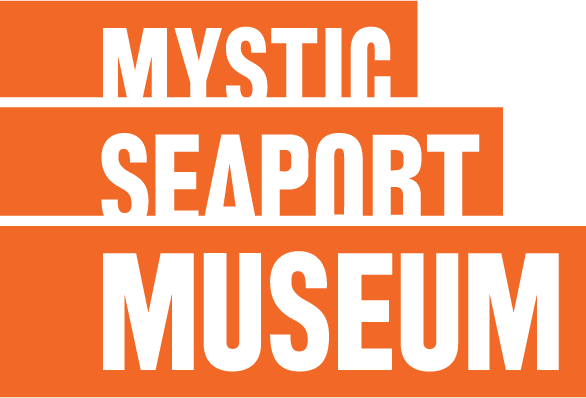
To great acclaim, Mystic Seaport Museum opened its newest exhibition J.M.W. Turner: Watercolors from Tate on Saturday, October 5, 2019. More than 140 members had gathered early in the morning to get a preview of the show before the doors opened to the general public. During Saturday morning, Museum visitors could also follow a discussion about J.M.W. Turner between the exhibition’s curator, David Blayney Brown, Tate’s Manton Senior Curator of British Art 1790-1850, and Nicholas R. Bell, senior vice president for Curatorial Affairs at Mystic Seaport Museum, in the River Room at Latitude 41° Restaurant & Tavern.
This major exhibition is organized in cooperation with Tate and will run through February 23, 2020. The show is drawn from the renowned Turner Bequest of 1856, the vast legacy of art donated to Great Britain by J.M.W. Turner (1775-1851), which resides today at Tate. Mystic Seaport Museum is the only North American venue for unique exhibition.
The exhibition spans the entirety of Turner’s long career and, by focusing on the artist’s watercolors, provides insight into the private visionary behind the public figure. The viewer will see Turner’s watercolor practice evolve from aide to memory to a way of thinking with his brush–“for his own pleasure,” to borrow a phrase from a contemporary admirer, the critic John Ruskin.
“Joseph Mallord William Turner is one of the great artists of the Western Canon,” notes Stephen C. White, president of Mystic Seaport Museum, the preeminent maritime museum in the United States. “In building our new exhibition center, the Thompson Exhibition Building, which opened in 2016, we prepared for loans of this caliber. Now we are thrilled to have Turner’s watercolors here for visitors throughout the region and country.”
Tate rations display of Turner’s watercolors, given the fugitive quality of the medium. But Tate balances conservation considerations with the mission to serve new audiences. “We are exceptionally pleased to have this intimate and powerful selection of works at Mystic Seaport Museum – the result of an ambitious and rewarding collaboration between the two organizations,” says Dr. Maria Balshaw, CBE Director, Tate.

Watercolors from Tate brings together 92 watercolors, four oil paintings, and one of the artist’s last sketchbooks. “Not one of these watercolors or the sketchbook would have survived had Turner had anything to do with it,” notes Curator David Blayney Brown. Before his death, Turner sought to cement his place in history by bequeathing the contents of his studio to the British nation. He envisioned that the finished oil pictures would hang in rotation in a Turner Gallery inside the National Gallery at Trafalgar Square. But that dream never came to pass and, in 1856, the Chancery Court overruled the artist’s wishes, saving the entire contents of the studio, including more than 30,000 watercolors and sketches stashed haphazardly in cupboards, crammed in drawers, and rolled between canvases.
Nicholas Bell says, “Watercolor has always been central to Turner’s art and its inspiration to others. Perhaps surprisingly for a North American audience, which has always had greater access to his oils, the watercolors have long competed in Britain with their weightier oil counterparts for museum-goers’ affections. What’s so marvelous about this gathering of loan works is that its very size makes it possible to follow Turner’s career trajectory in all its complexity.”
“Here we see not the public Turner, whose large oil paintings hung prominently in the Royal Academy, but the private artist who continually tested compositions, color, and tactile effect,” says David Blayney Brown.
Watercolors from Tate brings together luminous landscapes and atmospheric seascapes, architectural and topographical sketches, travel drawings, and even a number of intimate interior views. Some watercolors were completed in the studio; others, sketched en plein air. A number appear to have been dashed off on tiny slips of paper; others are finished works, conceived for display, incorporating ink, pencil and gouache. The earliest work on view is a romantic scene of a gorge painted in 1791 when Turner was 17 years old; the latest, painted 55 years later and exhibited at the Royal Academy five years before the artist’s death, is Whalers (Boiling Blubber) Entangled in Flaw Ice, Endeavoring to Extricate Themselves (1846).
The exhibition is organized into seven sections: “From Architecture to Landscape: Early Work,” “Nature and the Ideal: England c. 1805-15,” “Home and Abroad: 1815-30,” “Light and Color,” “The Annual Tourist: 1830-40,” and “Master and Magician: Late Work.”
The final section, “Turner and the Sea,” was curated especially for Mystic Seaport Museum. It is a selection of 17 watercolors, oils, and a sketchbook of scenes of the sea–shipwrecks, a beached boat, coastal views, and purely atmospheric images. Highlights include a graphite and watercolor drawing evoking with stark economy a vessel or whale stranded on a mountainous coast and Stormy Sea with Dolphins (c.1835-4), a major painting that last traveled to the U.S. in 1966 as part of a notable monographic exhibition at the Museum of Modern Art.
Publication
Conversations with Turner: The Watercolors accompanies Watercolors from Tate and is edited by Nicholas Bell.
The book’s format is inspired by this introduction of Britain’s seminal visual artist to new audiences. Following an introductory essay on Turner’s lifelong pursuit of excellence in watercolor by David Blayney Brown, an international cadre of established and rising scholars and artists meet in dialogue in a series of thematic “conversations” in print.
Addressing such areas as the evolution of Turner’s art in watercolor, evidence of rapid changes to England’s industry and culture in the early 19th century, his treatment of time and memory, and the question of how his works influence contemporary artists working today, these conversations are intended to offer the reader accessible entry points into the medium central to Turner’s development as an artist.
The book is co-published by Mystic Seaport Museum and Skira Editore.
Order your copy by calling the Museum’s Bookstore at 860.572.5386, or by clicking on the red arrow below:













